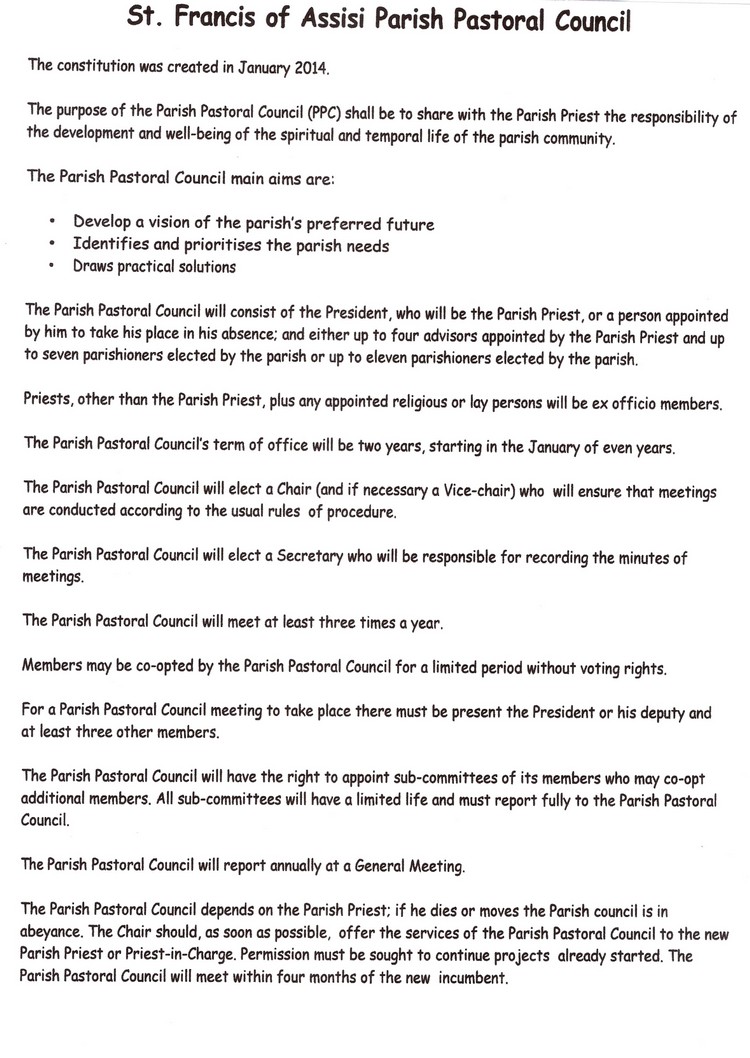Constitution

PARISH PASTORAL COUNCIL FOUNDATION DOCUMENT
St. Francis of Assisi Catholic Church, Middlesbrough
The diocesan Bishop, after consulting the Council of Priests, considers it opportune that a Pastoral Council may be established in each parish. In this Council, which is presided over by the parish priest, Christ’s faithful, together with those who by virtue of their office are engaged in pastoral care in the parish, give this help on fostering pastoral action.
The Pastoral Council has only a consultative vote, and it is regulated by the norms laid down by the diocesan Bishop (Can.536) & 515.
The Parish Pastoral Council as a body elected (eventually) by the parishioners, shall be a consultation group working with the parish priest (parish administrator) who has overall responsibility to the Bishop in the running of the parish.
Officers
i. The parish priest shall be the President of the Council.
ii. In the absence of the Chairman, the meeting will be chaired by the Vice-chairperson.
iii. The Chairman and Vice-chairperson are to be elected by the Council from among its members.
The chairperson’s duty will be to ensure that meetings are conducted according to the usual rules of procedure.
iv. A secretary is to be elected by the Council from among its members.
The Secretary will be responsible for recording the minutes of the meetings.
v. The Chairman, Vice-chairperson, Secretary and Treasurer should serve for one year and then be available for re-election.
Membership
i. Lay members will be elected and serve a term of two years; they will be eligible for re-election.
ii. Total membership should be approximately 12.
iii. Lay members should be baptized and confirmed Catholics.
iv. Pending elections, vacancies may be filled by co-option.
v. The Parish Pastoral Council will have the right to co-opt members when necessary, after discussion with the Chairman.
vi. The Parish Pastoral Council will have the right to appoint sub-committees of its members. Such sub-committees may co-opt members. All sub-committees will be limited in duration and purpose and must report fully to the Parish Pastoral Council.
Meetings
i. The Parish Pastoral Council should meet not less than three times a year.
ii. Extra meetings to cover outstanding business may be called by the Chairman.
iii. A quorum for all meetings shall be the Chairman or Vice-chairperson, together with at least half of the membership.
iv. All members may vote. The chairperson shall have a casting vote where necessary.
v. The Parish Pastoral Council must take care to keep the parish informed of its work and decisions by publishing a report of each meeting.
vi. A general parish meeting should be held annually, when the Parish Pastoral Council can report to parishioners and if required, appropriate elections can be held.
Purpose and function of the Parish Pastoral Council
The Parish Pastoral Council investigates, reflects and recommends.
Such a council:-
· Develops a vision of the parish’s preferred future.
· Identifies and prioritises the parish’s needs.
· Draws practical conclusions.
Supplementary
As the word ‘pastoral’ suggests, the parish priest establishes a council because he seeks practical advice on pastoral matters. This will investigate pastoral matters (i.e. anything to do with the parish) reflect on them thoroughly and draw practical conclusions.
The purpose of the Parish Pastoral Council, to quote Pope Paul VI, “is to examine and consider all that relates to pastoral work and to offer practical conclusions on these matters so that the life and activity of the parish may be brought into greater conformity with the Gospel.”
The role of the Parish Pastoral Council is to ‘plan pastorally’.
The Parish Pastoral Council helps the parish priest plan the parish’s pastoral programme.
It will identify the parish’s needs. Our parish wants to develop the gifts which God has given. This desire unleashes the parish imagination. Should we have a more festive liturgy, show greater hospitality, consider more outreach to the housebound and those outside our parish community? We also need to consider the maintenance and infrastructure of the buildings. The list of potential needs is endless. The Parish Pastoral Council will assist the parish priest by helping him see what the needs are.
Once the needs are identified, the Parish Pastoral Council will put them in order of importance. Then its most important task begins - to study how to meet those needs. It consults parishioners and experts, for instance, and then considers various options and the cost, if that is relevant. It studies and reflects in order to lay the foundations for sound decisions about what action to take. It then recommends what the parish, under the parish priest ought to do.
The recommendations of the Parish Pastoral Council have to become a reality. They must be implemented, but this is not strictly the work of the Parish Pastoral Council, though members will often be involved in the implementation.
